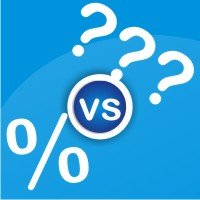What’s my Competitor’s Conversion Rate?

The question from the title is one of the worst questions a client can ask an online marketer. Conversion rate is the number of goal achievements divided by the number of website visitors shown in form of percentage. At e-commerce websites, the main goal is usually for visitor to make a purchase, thus making the conversion rate the number of visitors that bought something divided by the total number of visitors.
Once you explain the concept of conversion rate and process of conversion rate optimization, most of the clients will ask several questions, including:
- What’s my conversion rate?
- What’s the industry benchmark?
- What’s my competitor’s conversion rate?
We can’t really know the conversion rate of any website without the access to the website’s statistics, so we can’t answer the question from the title. The trick is – we don’t need to know our competitor’s conversion rate at all, so these are all wrong questions. Let me explain why…
We will imagine two websites: example.com and example.org. They have two different owners and they are competing in the same industry. Both websites are selling example widgets. The thing that’s unique about these websites is the way they receive the traffic.
Example.com invests a lot of money in their paid search engine listings but have little content marketing strategy. Example.org on the other hand doesn’t invest a lot in the paid search but is extremely active on social networks. Example.com has remarkable conversion rate of 23%. Example.org has only 0.03% conversion rate. The owner of example.org is disappointed with such a terrible conversion rate compared to his competitor, but little does he know that he makes much more money than his competitor due to a lot bigger visitor volume.
The point is, various sources give various quality of visitors. Some of the sources like paid search give us very targeted visitors that convert really well but cost a lot of money, while some sources like social networks are free but give us little control over targeting.
This is why comparing the conversion rate of two different websites is pointless. When performing conversion rate optimization, think of it as a closed system. You can’t really stop the less targeted visitors from visiting your website, and you don’t want to, since some of them buy something anyway. Don’t chase that magic number (the percentage) but concentrate on the profits instead.
What’s a good conversion rate for my store?
When the client asks you the tricky question – “What’s a good conversion rate for my store?” – tell him it’s the conversion rate that brings him profit. Unless your conversion rate is 100%, there is always space for improvement (although you will never achieve 100% conversion rate or even come close to that number in practice).

 Top 11 Conversion Rate Optimization Tools
Top 11 Conversion Rate Optimization Tools 5 Conversion Rate Optimization Tips All Bloggers Should Know
5 Conversion Rate Optimization Tips All Bloggers Should Know Use of Visual Imagery on Websites – Best Practices that Improve Conversions
Use of Visual Imagery on Websites – Best Practices that Improve Conversions 4 Basic Elements On Starting A Blog and Nurturing It To Profits
4 Basic Elements On Starting A Blog and Nurturing It To Profits
{ 15 Responses }